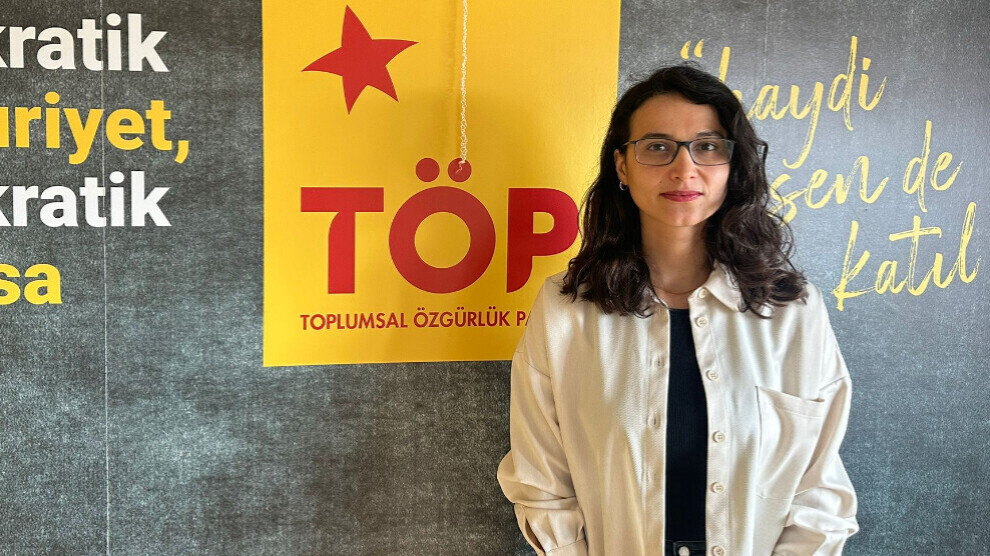More than a month has passed since local elections in Turkey. Erdoğan's AKP suffered the biggest electoral debacle in two decades in the vote on 31 March. The CHP's victory had shattered the regime leader's aura of invincibility, and his Islamist-conservative party became only the second-strongest force for the first time since its founding in 2002. However, current developments in Turkey and the entire region make it clear that Erdoğan and others are not prepared to give up their power and see the assertion of their interests at risk. The policy of war and repression is being persistently expanded.
Pelin Kahiloğulları, one of the spokespersons for the Party for Social Freedom (TÖP), believes that Erdoğan has passed his peak. The politician, who was born in Hatay in 1990, admits that the AKP government has been able to overcome every defeat since the Gezi Park protests eleven years ago and get back on its feet. However, the results of the local elections have now clearly shown that Erdoğan is no longer untouchable and that there are real opportunities for the opposition to implement a radical change of course in Turkey.
The regime has lost its legitimacy
In an interview with ANF Kahiloğulları said: “The AKP regime had already lost massive amounts of legitimacy before the parliamentary and presidential elections last year and was only able to avoid losing through intensive fraud,” adding that “the AKP opened up new fields of employment, she sai with a number of measures in the run-up to the elections, apparently reduced unemployment and partially mitigated the consequences of the economic crisis. However, people would have had to pay a high price for this after the elections. In this way, the AKP was able to prevent a situation and a defeat like the one in the current elections.”
Erdoğan is no longer a strong unifying element
Kahiloğulları said there were various factors that brought to the AKP current defeat: “One factor is the worsening of the effects of the economic crisis on everyday life. The rise in unemployment and the impoverishment of millions of people, including pensioners, comes on top of the daily rising cost of living. The economic plan to increase the wealth of capital, also known as the Mehmet Şimşek program [Mehmet Şimşek is Erdoğan's finance minister], and the 12th development plan have impoverishment accelerated even further. In addition, fraud as practiced in the presidential election, was not possible in these elections. Another factor lies in the fact that Erdoğan's ‘leadership role’ - although he went through almost every city in the election campaign toured – began to weaken relatively quickly as CHP politician and Istanbul Mayor Ekrem Imamoğlu came to the fore as an alternative leader.”
It will be difficult to restore legitimacy now
Pelin Kahiloğulları noted that the results of the local elections of 31 March 20204 and the parliamentary elections of 7 June 2015 could be compared with certain limitations. She said: “After 7 June, a similar transfer of moral force to social opposition was observed. However, I must underline that the government's loss of power and legitimacy crisis are deeper today than they were then. When the AKP was supposedly negotiating a grand coalition with the CHP, it was making preparations in the background to turn the republic into a country of bombs. It tried to regain the power it lost on 7 June by creating a 'shock effect' with successive attacks in Diyarbakır, Suruç and Ankara. So she used direct violence. As we know, the regime was able to achieve its goal with the elections of 1 November 2015. Today it is much more difficult for the ruling powers to restore legitimacy through naked force. Of course, I am not saying that it is not possible, after all, the reality of the government and the state is suitable for this. But the path chosen to emerge from the economic crisis will deepen poverty and unemployment and increase people's anger.”
Violence leads to chaos
Kahiloğulları said: “The government is also aware of the spreading resistance of the workers, the ongoing striving for freedom of the Kurdish people, the current situation of women, Alevis, environmentalists, farmers defending their land and young students make the path of naked violence a dead end. It will pave the way for a complete dilution of power. Addressing such a social reality only with naked force will maneuver the government into a predicament where violence will become ever more widespread and even indiscriminate, and will increase the likelihood that the country will plunge into chaos.”
A new social consciousness
Kahiloğulları recalled the special phase before the 2015 elections, the Gezi protests and the broad search for a democratic life together with the Kurdish freedom struggle: “Back then, we were able to create the political alliance and a program that was necessary for such a critical time The alliance was not specifically expressed. Nevertheless, the peoples of Turkey, the Kurds, the workers, the women, the youth, the environmental activists continued and continue their resistance by manifesting their demands. Sometimes the resistance came to the fore, sometimes it retreated. I believe that this process of resistance, which has continued in some ways since Gezi, has created a new social consciousness. On the other hand, we cannot ignore that the state of constant violence and tension simultaneously dissolves the values that hold society together and causes social decay. Therefore, I must note that if the current angry reactions of the people cannot be integrated into a broad democratic position, the said decay can quickly increase and from here an environment suitable for fascism will be created.”













